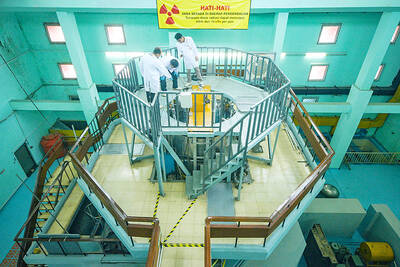A freelance reporter for the Miami Herald's Spanish language newspaper said on Friday he is leaving Colombia because of death threats he received after being criticized by the Colombian president.
Gonzalo Guillen said he was preparing to depart yesterday after receiving 24 death threats in 48 hours.
ESCOBAR LINK
Colombian President Alvaro Uribe on Tuesday accused the 55-year-old journalist of ghostwriting a book by a former mistress of the late drug lord Pablo Escobar that alleges Uribe was a friend of the Medellin cocaine cartel.
"Behind this lady is Gonzalo Guillen who has dedicated his journalistic career to infamy and lies," the president, who has repeatedly denied any ties to Escobar, said on radio.
Guillen has denied any connection to the book Loving Pablo, Hating Escobar, written by former Escobar mistress Virginia Vallejo.
"I did not write the book, nor have I read the book," Guillen said.
Repeated calls to the president's press secretary, Cesar Mauricio Velasquez, were not returned.
THREATS
El Nuevo Herald executive editor Humberto Castello said the threats were from paramilitaries, illegal far-right militias that have backed the government's tough anti-guerrilla policies.
Castello said he was extremely worried about the journalist, whom he said has contributed to the paper from Colombia since 1999.
The Colombian journalist said he believes Uribe is also upset with a book he published in May, The Confidants of Pablo Escobar, which claims that the Uribe family had ties to organized crime.
Violent drug cartels, far-right death squads and leftist rebels have made Colombia a precarious place for reporters.
At least 40 journalists have been killed in the country since 1992, the New York-based Committee to Protect Journalists said.
"We are concerned that the president's comments could endanger our colleague Gonzalo Guillen," Committee to Protect Journalists executive director Joel Simon said in a statement on Wednesday. "We call on President Uribe to abstain from making such accusations."

Four people jailed in the landmark Hong Kong national security trial of "47 democrats" accused of conspiracy to commit subversion were freed today after more than four years behind bars, the second group to be released in a month. Among those freed was long-time political and LGBTQ activist Jimmy Sham (岑子杰), who also led one of Hong Kong’s largest pro-democracy groups, the Civil Human Rights Front, which disbanded in 2021. "Let me spend some time with my family," Sham said after arriving at his home in the Kowloon district of Jordan. "I don’t know how to plan ahead because, to me, it feels

Poland is set to hold a presidential runoff election today between two candidates offering starkly different visions for the country’s future. The winner would succeed Polish President Andrzej Duda, a conservative who is finishing his second and final term. The outcome would determine whether Poland embraces a nationalist populist trajectory or pivots more fully toward liberal, pro-European policies. An exit poll by Ipsos would be released when polls close today at 9pm local time, with a margin of error of plus or minus 2 percentage points. Final results are expected tomorrow. Whoever wins can be expected to either help or hinder the

North Korea has detained another official over last week’s failed launch of a warship, which damaged the naval destroyer, state media reported yesterday. Pyongyang announced “a serious accident” at Wednesday last week’s launch ceremony, which crushed sections of the bottom of the new destroyer. North Korean leader Kim Jong-un called the mishap a “criminal act caused by absolute carelessness.” Ri Hyong-son, vice department director of the Munitions Industry Department of the Party Central Committee, was summoned and detained on Sunday, the Korean Central News Agency (KCNA) reported. He was “greatly responsible for the occurrence of the serious accident,” it said. Ri is the fourth person

SKEPTICAL: Given the challenges, which include waste disposal and potential domestic opposition, experts warn that the 2032 nuclear timeline is overambitious Indonesia is hoping going nuclear can help it meet soaring energy demand while taming emissions, but faces serious challenges to its goal of a first small modular reactor by 2032. Its first experiment with nuclear energy dates to February 1965, when then-Indonesian president Sukarno inaugurated a test reactor. Sixty years later, Southeast Asia’s largest economy has three research reactors, but no nuclear power plants for electricity. Abundant reserves of polluting coal have so far met the enormous archipelago’s energy needs, but “nuclear will be necessary to constrain the rise of and eventually reduce emissions,” said Philip Andrews-Speed, a senior research fellow at the